📅 What is Halal Food? A Complete Guide to Halal & Haram Foods
Halal food is more than just a dietary choice – it represents a spiritual and ethical way of living for Muslims worldwide. The concept of halal (lawful) and haram (forbidden) originates from the Quran and Sunnah, forming the foundation of Islamic dietary laws. With growing global awareness about halal products, understanding what halal food truly means is essential not only for Muslims but also for businesses and non-Muslims who want to respect Islamic traditions.
In short: Halal food is any food and drink permissible under Islamic law, prepared according to the Quran and Hadith guidelines.
💡 Principles of Halal Food
Halal food is not defined only by what is eaten, but also by how it is sourced, prepared, and consumed. These principles ensure that what enters the body is pure (tayyib) and lawful (halal).
Primary Principles
- Source of Ingredients: All ingredients must come from halal sources. For example, beef, chicken, fish, grains, fruits, and vegetables are halal when sourced properly.
- Prohibition of Haram Items: Anything harmful, intoxicating, or explicitly forbidden in the Quran and Sunnah is not allowed.
- Animal Welfare: Animals must be treated with kindness before slaughter.
- Cleanliness and Purity: Food must be prepared in a clean environment, free from cross-contamination with haram substances.
💡 Halal Foods According to Quran and Hadiths
The Quran and Hadiths provide clear guidance on what is halal and haram.
Quranic Guidance
Allah ﷻ says:
“O mankind, eat from whatever is on earth [that is] lawful and good…” (Surah Al-Baqarah 2:168)
Another verse:
“Forbidden to you (for food) are: dead meat, blood, the flesh of swine, and that on which has been invoked the name of other than Allah.” (Surah Al-Ma’idah 5:3)
Prophetic Guidance
The Prophet ﷺ emphasized moderation and purity in food, saying:
“The lawful is clear, and the unlawful is clear, and between the two are doubtful matters which many people do not know.” (Sahih al-Bukhari, Sahih Muslim)
💡 Permissible and Prohibited Foods in Islam: Comparison Table
| Category | Permissible (Halal) | Prohibited (Haram) |
|---|---|---|
| Meat | Beef, lamb, goat, chicken (slaughtered Islamically) | Pork, carnivorous animals, carrion |
| Seafood | Fish, most sea creatures (majority opinion) | Aquatic predators (some schools differ) |
| Drinks | Water, milk, fruit juices | Alcohol, intoxicants |
| Plant-based | Fruits, vegetables, grains, nuts | Intoxicating plants, harmful toxins |
| Dairy | Milk, cheese (halal rennet), yogurt | Cheese with non-halal rennet |
| Additives | Plant-based gelatin, halal enzymes | Pork gelatin, alcohol-based flavorings |

💡 The Slaughtering Process (Dhabīḥah)
One of the most important aspects of halal meat is the slaughtering process known as dhabīḥah.
Key Conditions
- The slaughter must be done by a Muslim (or a person of the Book according to some scholars).
- The name of Allah (Bismillah, Allahu Akbar) must be pronounced.
- The throat, windpipe, and blood vessels in the neck must be swiftly cut with a sharp knife.
- The animal must be alive and healthy at the time of slaughter.
- Blood must be drained completely from the body.
Hadith Reference
The Prophet ﷺ said:
“Verily Allah has prescribed excellence in everything. So when you kill, kill well, and when you slaughter, slaughter well. Let each of you sharpen his blade and let him spare suffering to the animal he slaughters.” (Sahih Muslim)
💡 What is Halal Certification?
Halal certification ensures that a product complies with Islamic dietary laws. It is especially important in packaged, processed, and imported foods.
Purpose of Halal Certification
- Builds consumer trust
- Provides transparency for Muslims
- Helps businesses access global halal markets
Global Halal Certification Bodies
- JAKIM (Malaysia)
- IFANCA (USA)
- HFA (UK)
- Majlis Ulama Indonesia (MUI)
What Certification Covers
- Ingredient sourcing
- Processing methods
- Packaging and storage
- Avoidance of cross-contamination
💡 Conditions for Food to Be Halal
For food to be halal, it must meet certain conditions:
- The source must be halal (animal, plant, or synthetic).
- The method of slaughter must comply with Islamic law.
- Food must not be mixed with haram substances during processing.
- Utensils, storage, and preparation must avoid contamination with haram.
- Intoxicants and harmful ingredients must not be present.
Halal Food in Different Cultures 🌍
While the foundation of halal food remains the same across the Muslim world — following the Qur’an and Sunnah — its expression varies by culture and geography.
- Middle Eastern Countries: Dishes like shawarma, hummus, falafel, and kebabs are not only halal by ingredients but also tied to traditional methods of preparation and slaughter. Meat is carefully sourced, and hospitality often revolves around halal meals.
- South Asia (Pakistan, India, Bangladesh): Halal practices are deeply integrated into daily cooking. Famous dishes such as biryani, nihari, and kebabs are typically halal, and certification is less emphasized since halal food is the norm.
- Southeast Asia (Malaysia, Indonesia): These countries have some of the most advanced halal certification systems in the world. Packaged foods, beverages, and even international chains like McDonald’s and KFC carry halal certification.
- Western Countries (USA, UK, Europe): With growing Muslim populations, halal certification has become crucial for packaged foods, restaurants, and even fast-food chains. Halal butchers and halal-friendly grocery stores are increasingly common.
- China, Japan, and Other Regions: Halal food is often available near mosques or Muslim communities. Tourists and locals rely heavily on halal certification symbols to ensure compliance.
In essence, while the rules of halal remain consistent, cultural flavors, local cuisines, and regulatory approaches make the halal experience unique in every region.
💡 Benefits of Eating Halal Food
Halal food is not only spiritually pure but also beneficial for health and community trust.
Health Benefits
- Hygienic Slaughter Process: Reduces harmful bacteria and toxins.
- Avoidance of Harmful Substances: No alcohol, no pork-based additives, fewer risks of food-borne diseases.
- Emphasis on Freshness: Blood removal prevents spoilage and contamination.
Spiritual Benefits
- Eating halal strengthens faith and obedience to Allah.
- Consuming haram can spiritually harm the heart.
The Prophet ﷺ said:
“Every body that is nourished with haram, the Fire is more deserving of it.” (Sunan At-Tirmidhi)
💡 Which Drinks Are Halal in Islam?
In Islam, drinks are halal as long as they are pure, non-intoxicating, and free from harmful substances.
Examples of Halal Drinks
- Water 💧
- Milk 🥛
- Fruit juices 🍎
- Herbal teas 🌿
- Coffee ☕
Haram Drinks
- Alcoholic beverages 🍷
- Fermented drinks with intoxicating effects
- Energy drinks containing haram ingredients (e.g., taurine from non-halal sources)
Allah ﷻ says:
“O you who have believed, indeed, intoxicants, gambling, [sacrificing on] stone alters [to other than Allah], and divining arrows are but defilement from the work of Satan, so avoid it that you may be successful.” (Surah Al-Ma’idah 5:90)
💡 Halal Packaged Foods and Ethical Considerations
With the rise of supermarkets and global trade, packaged foods have become a major part of Muslim diets. Ensuring these products are halal goes beyond ingredients — it also includes ethical aspects.
What to Look For in Packaged Foods
- Halal Certification Marks: Verified logos from recognized halal bodies.
- Ingredient Transparency: Clear labeling of additives, gelatin, emulsifiers, and enzymes.
- Cross-Contamination Checks: Factories should avoid processing both halal and non-halal foods on the same line.
Ethical Considerations
- Fair Sourcing: Ensuring ingredients are obtained ethically without exploitation.
- Sustainability: Preference for environmentally responsible production.
- Animal Welfare: Assurance that animal-based ingredients come from animals slaughtered humanely according to Islamic law.
- Corporate Responsibility: Supporting companies that respect Muslim consumers and uphold halal integrity.
💡 Common Halal and Haram Ingredients
| Ingredient | Halal Example | Haram Example |
| Gelatin | Fish gelatin, halal bovine gelatin | Pork gelatin |
| Rennet | Microbial/vegetable rennet | Animal rennet from non-halal slaughter |
| Enzymes | Plant-based enzymes | Enzymes from swine or dead animals |
| Flavorings | Natural fruit extracts | Alcohol-based flavorings |
| Oils & Fats | Olive oil, sunflower oil | Lard, fats from non-halal animals |
| Sweeteners | Honey, cane sugar | Alcohol-derived syrups |
| Vinegar | Synthetic/acetic vinegar | Wine vinegar (fermented with alcohol) |
💡 Emerging Issues in Halal Food
With modern food technology, Muslims face new questions about what is halal.
Lab-Grown Meat
- Scholars debate whether lab-grown meat is halal.
- Key issues: source of animal cells, growth medium, and whether slaughter applies.
Plant-Based Alternatives
- Most plant-based meats are halal unless processed with alcohol flavorings.
- Certification is still recommended.
Insects and Novel Foods
- Some schools of thought allow insects like locusts, while others prohibit them.
- Novel foods (algae, synthetic proteins) require fatwa guidance.
Processed Foods and Additives
- Gelatin, rennet, emulsifiers, and enzymes need scrutiny.
- Alcohol-based flavorings are a common grey area.
Difference Between Halal and Kosher ✡️🕌
Kosher (Jewish dietary laws) and Kosher (Jewish dietary laws) share similarities, but they are not identical. Both emphasize purity, ethical slaughter, and spiritual obedience, but their methods and rules differ.
| Aspect | Halal (Islamic) 🕌 | Kosher (Jewish) ✡️ |
|---|---|---|
| Sacred Texts | Qur’an & Hadith | Torah & Talmud |
| Slaughtering | Performed by a Muslim; name of Allah must be invoked (Bismillah, Allahu Akbar). | Performed by a trained Jewish slaughterer (shochet); blessing is recited. |
| Blood | All blood must be drained. | All blood must be drained. |
| Permissible Animals | Land animals that chew cud and have split hooves (except pig), poultry, fish with scales. | Similar, but stricter: only animals with split hooves and that chew cud (no camels, rabbits, etc.). |
| Prohibited Foods | Pork, alcohol, carnivorous animals, improperly slaughtered meat. | Pork, shellfish, mixing meat and dairy, improperly slaughtered meat. |
| Meat + Dairy | Allowed together (e.g., cheeseburger if ingredients are halal). | Strictly forbidden — meat and dairy cannot be cooked or consumed together. |
| Certification | Halal certification authorities (JAKIM, IFANCA, etc.). | Kosher certification authorities (OU, Star-K, etc.). |
Key takeaway: Both systems prioritize ethical treatment of animals and spiritual obedience, but kosher laws are often stricter — especially regarding dairy and meat combinations. Muslims can sometimes consume kosher meat (since it is slaughtered in the name of God), but Jews generally do not recognize halal as kosher.
🔧 Conclusion
Halal food is not just about what Muslims eat – it’s about faith, ethics, health, and global awareness. By following the principles of halal and avoiding haram, Muslims fulfill a divine command and maintain both physical and spiritual well-being. With new challenges like lab-grown meat and processed foods, halal awareness is more important today than ever.
Key Takeaway: Halal food is lawful, pure, and beneficial for both the body and soul, ensuring a balanced way of life in accordance with Islam.
Frequently Asked Questions
What is the difference between halal and haram?
Halal refers to what is permissible under Islamic law, while haram refers to what is forbidden. For instance, pork and alcohol are considered haram.
Can non-Muslims eat halal food?
Yes, non-Muslims can eat halal food. It is prepared with high standards of hygiene and ethical practices, which can be beneficial to all consumers.
What should I look for in a product to ensure it is halal?
Look for a halal certification mark from a recognized certifying body. This indicates the product has been verified to meet halal standards.
Is halal food healthier?
Halal food emphasizes cleanliness, ethical animal treatment, and the avoidance of harmful substances, which can contribute to a healthier diet. However, overall health also depends on the food's nutritional content and preparation methods.
Can a product lose its halal status?
Yes, if halal food is contaminated with haram substances during processing, storage, or preparation, it can lose its halal status.








Hey people!!!!!
Good mood and good luck to everyone!!!!!
Fabulous, what a webb site it is! This blog presents valuable information to us,
keep it up. https://tri1ls.webflow.io
Fabulous, what a web site it is! This blog presents valuable
informatioon to us, keep it up. https://tri1ls.webflow.io
Hey people!!!!!
Good mood and good luck to everyone!!!!!